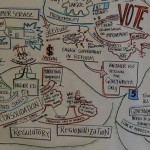Rhode Island Politics: a Game That the State Can’t Win
People periodically give me incredulous looks when I tell them I dislike politics. The campaign horse race is a roundabout annoyance of spin, and more importantly, it simply isn’t appropriate to view politics as a team sport. Depending on the level of government, thousands or millions of people’s lives are directly affected by the policies that result.
Note that I’m saying that the team-sport mindset is not merely inadequate or imperfect; I’m insisting that it is inappropriate. There’s just no such thing as an objective referee or rules. Imagine if, over the course of some major sporting event, the winning team were able to rewrite the rules in their favor. We’d rebel against that even when nothing more is invested than our ticket price for entertainment; how much more ought we to recoil from it in relation to our very communities!
Yet, sports may be the closest metaphor available for us to organize the idea of politics, with its mix of partisans and special interests in competition, into a form that we can get our heads around. Thus, WPRI’s Ted Nesi comments, in his bullet-pointed Saturday column:
Love them or hate them, folks like the AFT’s Maureen Martin, NEARI’s Pat Crowley and SEIU’s Chas Walker know how to win elections on the ground. And they have an army of members who’ll do the unglamorous work of knocking on doors, putting up fliers, holding signs and driving people to the polls. Business interests should build up a ground game of their own if they want to win more races.
How the Game Works
It’s true that, at least in the U.S. tradition, constitutions and charters tend to start out as close to objective rules as it is feasible to come, but over time, they’re subject to erosion, especially as the reach of government expands. In place of a referee, they typically endeavor to align somewhat equal competing interests to guard against each other, with a free press to spread necessary information for the public to judge.
Within this framework, it is critical that everybody have a sense of unified community and commitment to absolute, universal moral standards about the general concepts of fairness and justice. The problem with the team-sport perspective in politics is that it lessens the weight of such moral constraints. Sure, there’s such a thing as “sportsmanlike conduct,” but in sports, everything within the rules is fair and moral; nobody complains that one player fumbled the ball because he was distracted by his overdue mortgage. He should have left that problem off the field.
Turning to the example at hand, it isn’t the statement that the three union organizers are “smart” that bothers me, although I think it akin to congratulating mob enforcers for being so strong and threatening. Rather, it’s Nesi’s closing suggestion — that the one conclusion is that the private sector needs to improve its “ground game” — that leads me to worry that our problems may be too entrenched to rout.
Education and school budget reform provides an excellent context for illustrating the magnitude of the problem. Given the rules that have entered into Rhode Island law over time (through legislation, judicial declarations, and established practice), a significant change in policy would require:
Enough residents (with other means of income) to run for school committee against well-funded national organizations and members who retire so young that they’ve decades to dabble in local politics. Those civically minded souls must win a majority of the committee so that they could stand some chance of pushing back against the in-the-establishment professionals who run the district, while hoping that the teachers and other employees won’t resort to harming students, while they (the committee) are vilified and pressured to massive extent outside the experience of most ordinary people. Through these trials, they can implement some policies that are sure to be challenged in the judiciary, at the cost to their town of hundreds of thousands or millions of dollars, and they must strive to push further back against a heavily funded and deeply self-interested state bureaucracy and a legislature under the strong influence of the very same powerful national organizations.
If enough volunteers can be found, despite the difficult scheduling and increased public vulnerability, “business interest” reformers can elevate their activities to the State House. But to be effective, it isn’t enough for them to claim a handful of additional seats in the state legislature and a few executive offices; they must stitch together a majority in two chambers to pass legislation that the governor will not veto (or that will survive a veto). And then there are sure to be more court challenges and efforts to dilute the law, as well as annual attempts to rewrite it, all while the federal government pushes contrary incentives from above.
The Other Team
The coalition that would climb this mountain of challenges must do so against an opposing force that has an unmatched unity of purpose — in many senses, a monopoly. Think of the biggest company in the state, and then compare it to the size in workforce and financial clout of the incorporated whole of the Rhode Island public school system (add in the other public-sector unions). And then consider that that company, and all of its fellow “business interests,” must compete in their primary line of occupation against each other and against others around the world on price and quality. And then balance the company’s incremental and often indirect interest in pro-business public policies against the direct and substantial relationship between laws and political campaigns and the entire lifetime earnings and pensions of each individual public employee. Finally, consider that the money financing not only all of the incentives for public employees to double as political activists (the “smart” folks’ boots on the ground), but also the campaign and lobbying activities of the union organizations themselves, comes directly from tax dollars, not as diversions of personal income.
Let’s assume, for a moment, that it would be appropriate for private companies to urge political activism among their employees to an extent to rival the public sector. Is this really a model that a community with limited resources should accept as reasonable — that the state’s economy must bear not just the cost of public services, but both sides of a ceaseless political struggle? Do we really want our civic system to be such that residents feel compelled to spend as much time fighting over their government’s policies as possible? (Perhaps, here, we see the roots of Rhode Islanders’ apathy and despair.)
More acutely, the high barriers just described will lead all but the most dedicated (or insane) to calculate that resources are best spent elsewhere. In many cases, the calculation is sure to be that it is more cost effective, more conducive to personal comfort, and more certain an outcome simply to move operations out of state, or to set up shop elsewhere in the first place.
At least as indicated by their historical behavior, the people of Rhode Island don’t want to “win more races.” They want to live and to thrive and to enjoy all of those aspects of “quality of life” that attracted them and their families to the Ocean State in the first place.
I submit that a political philosophy that treats all this as a competition of political interests is an experiment doomed to failure and in need of an alternative metaphor.



